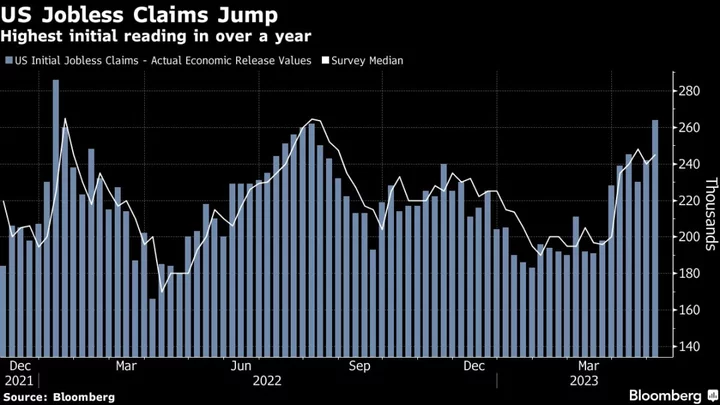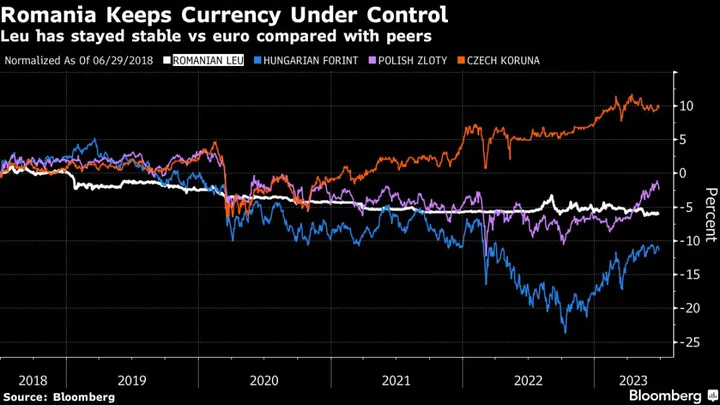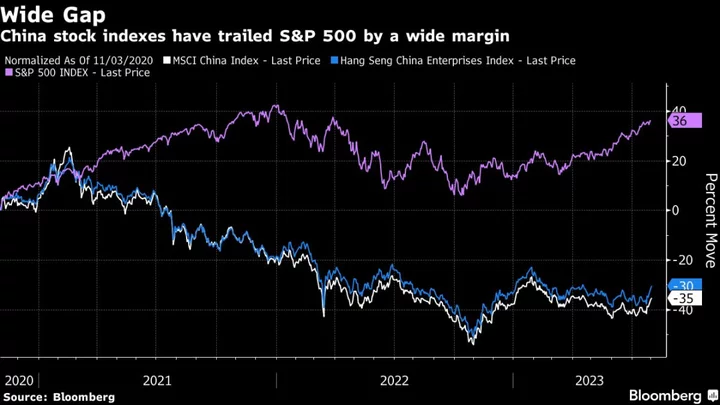The Bank of England said the UK’s eight largest lenders all passed its latest stress test, which examined their resilience to an economic shock worse than the financial crisis.
The firms would have enough capital to continue lending through strains to the economy including a housing market crash, surging unemployment and interest rates as high as 6%, according to the results published on Wednesday.
“The UK banking system has the capacity to support households and businesses through a period of higher interest rates, even if economic and financial conditions were to be substantially worse than expected,” the BOE said in a statement. “The scenario is considerably more severe than the current macroeconomic outlook.”
Barclays Plc, HSBC Holdings Plc, Lloyds Banking Group Plc, Nationwide Building Society, NatWest Group Plc, Banco Santander SA’s British arm, Standard Chartered Plc and Virgin Money UK Plc were tested this year. Together they account for around 75% of lending to the UK economy.
Shares in the lenders were trading higher in London. Virgin Money rose as much as 7.6%, its best intraday performance since November, as the bank confirmed it would resume share buybacks during this year.
While the lenders were expected to pass the tests, Numis analyst Jonathan Pierce said “those worried about asset quality and the ability of banks to distribute should be comforted by the quantitative aspects of this.”
Katie Murray, NatWest’s chief financial officer, said the results highlighted the bank’s “all weather balance sheet, enabling us to support our customers and the economy, delivering sustainable value creation and strong distributions for shareholders.”
Together, the banks have high-quality liquid assets with a market value of £1.4 trillion ($1.8 trillion), with around two thirds in cash or central bank reserves, the BOE said. This means they would have ample resources to continue lending even if liquidity in the markets came under stress.
Under the scenario, credit impairments were the main cause of capital depletion because of affordability pressures from inflation, higher interest rates, unemployment and lower GDP. Impairments over the five years of the stress test total £125 billion, according to the Bank of England — £9 billion less than in the 2019 test on a constant currency basis.
Banks improved on this measure due to a mix of temporary and long-term factors, including better loan-to-value ratios on mortgages after years of rising house prices, the boom in state-guaranteed Covid-19 business loans and firms’ decisions to exit some riskier lending such as overseas credit cards.
Still, the BOE emphasized that banks would likely cut shareholder payments, reduce bonuses and take other measures to cope with severe economic stress. Under the test scenario, the lenders would cut total dividends from £8.9 billion to about £100 million.
The test began in September after a six-month delay following Russia’s invasion of Ukraine. It included the UK base rate rising rapidly to 6% in early 2023 before gradually falling back to below 3.5%. This compares to current market pricing, implies the BOE’s key rate will rise to 6.5%. That would be the highest since 1998.
Adam Terelak, an analyst at Mediobanca in London, questioned the value of the test for investors given UK rates are already so high. “It’s interesting that stressed interest rates according to the BOE are 6%. A book exercise won’t get investors to think it’s all okay,” he said.
The BOE also examined how well banks would cope with UK GDP contracting by 5%, unemployment more than doubling to 8.5% and residential property prices falling by 31%.
All lenders passed the BOE’s previous stress test in December 2021, with the central bank concluding they could weather a double-dip recession and Covid-19 societal adjustments that last for years. In the wake of the financial crisis, the BOE introduced regular testing in 2014 to check the sector had enough capital to withstand economic difficulties.
--With assistance from Greg Ritchie.
(Updates with latest share prices, analyst comments from fifth paragraph.)









